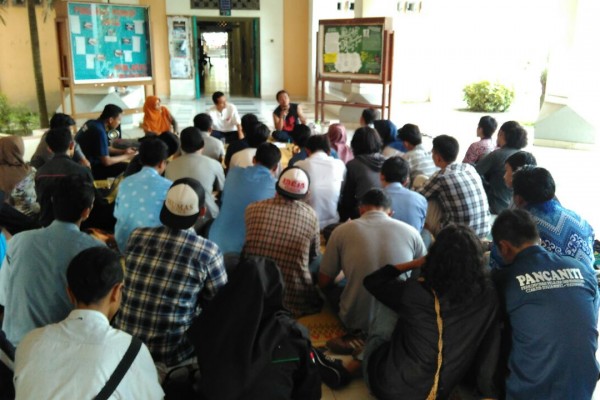Open Discussion: Property Growth in Yogyakarta Loaded with Political Economic Interest
 Wednesday 16 March 2016, at 15.00 WIB held at Faculty of Political Sciences and Social Sciences Lobby, Community of Governmental Studies (KKP) again held an open discussion titled Political Economy Property Growth in Yogyakarta. The debate was attended by two speakers namely Dodo Putra Bangsa (Activist of Powerful Community) and Eko Priyo Purnomo (Lecturer of Government Affairs and Administration UMY) wanted to photograph the struggle of political and economic interest from the proliferation of modern hotels, apartments and housing growth in Yogyakarta which became public discussion, especially in in the midst of today’s Yogyakarta society.
Wednesday 16 March 2016, at 15.00 WIB held at Faculty of Political Sciences and Social Sciences Lobby, Community of Governmental Studies (KKP) again held an open discussion titled Political Economy Property Growth in Yogyakarta. The debate was attended by two speakers namely Dodo Putra Bangsa (Activist of Powerful Community) and Eko Priyo Purnomo (Lecturer of Government Affairs and Administration UMY) wanted to photograph the struggle of political and economic interest from the proliferation of modern hotels, apartments and housing growth in Yogyakarta which became public discussion, especially in in the midst of today’s Yogyakarta society.
The discussion begins with the narrative of Dodo Putra Bangsa experience, which some time ago also took action to bathe the ground in front of the Fave Hotel, in advocating for the people who experience drought after the construction of Fave Hotel. His advocacy was fruitless with the closing of the Fave Hotel which proved to have not tested the pumping test before the development process.
Eko Priyo Purnomo added that the growth of property that occurred in Yogyakarta could not be separated from the phenomenon of political economy and political ecology. The capital that moved in Yogyakarta was so extraordinary that it made Yogyakarta experience the rapid economic growth of one of the properties. Also, high social capital makes Yogyakarta as a comfortable area to be a life goal so that demand for property never ends. One of the instruments that need to be monitored to manage property growth is how much of the Privileged Fund budget is allocated for environmental conservation.
In this occasion, there was also “Jogja Ora Didol Community” and Community of Powerful Residents who also told about the struggles in advocating the people affected by property development in Jogja. Also, Elanto (Jogja Ora Didol Movement) also invites UMY students to not only benefit from the joy of living in Yogyakarta but should also participate in fighting for the interests of the people of Yogyakarta so as not to lose its original character due to the massive growth of property.
The end of the discussion moderated by Asmarawati H (UMY Government Affairs and Administration lecturer) concludes with three main conclusions: First, to protect the public interest on the negative impact of property growth in Yogyakarta need to build a joint networking movement so that success in intervening in government policy on property growth can meet achievements such as the successful advocacy of the Milian residents against the Fave Hotel. Secondly, there is a need for education for migrants to Yogyakarta as well as to the community to protect the local wisdom of the people of Yogyakarta better. Third, that caring and civic and students and society are very important and waiting to defend the interests of the people of Yogyakarta on the impact of rapid property development in Yogyakarta. (Tfn)